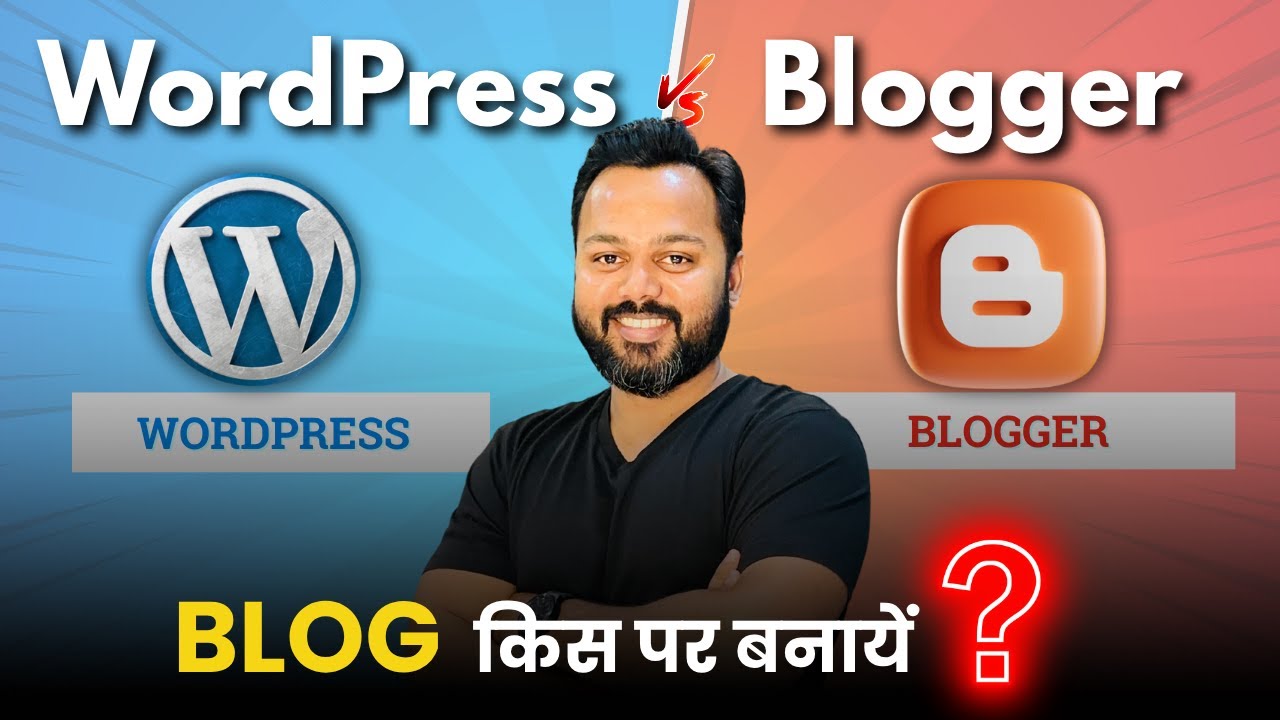Blog
WordPress VS Blogger? Choose the ✅ RIGHT Blogging Platform

Introduction: The Critical Choice Between Two Blogging Giants
Selecting the right platform for your blog is a decision that can shape your online presence, audience reach, and long-term growth. Among the most debated options are WordPress and Blogger, both offering distinct advantages depending on your goals. While Blogger is known for simplicity and quick setup, WordPress boasts unparalleled flexibility and control. This guide breaks down their features, helping you align your choice with your vision.
Ease of Use: Which Platform is More Beginner-Friendly?
For new bloggers, a platform’s learning curve can make or break the experience.
Blogger’s Straightforward Approach
Owned by Google, Blogger requires minimal setup. Sign in with a Google account, choose a template, and start writing. The interface is intuitive, with drag-and-drop tools and a clutter-free dashboard. It’s ideal for hobbyists or those prioritizing simplicity over advanced features.
WordPress: A Learning Curve with Greater Rewards
WordPress.org (the self-hosted version) demands more effort upfront. Users must purchase hosting, install the software, and navigate a robust dashboard. However, the block editor (Gutenberg) simplifies content creation, and the platform’s scalability justifies the initial complexity.
Verdict: Blogger wins for simplicity, while WordPress suits those willing to invest time for long-term gains.
Customization and Design Flexibility
Your blog’s design impacts brand identity and user engagement.
Blogger’s Limited but User-Friendly Templates
Blogger offers a handful of free, mobile-responsive themes. Customization options are basic—colors, fonts, and layouts can be tweaked without coding. However, the lack of plugins or third-party integrations limits functionality.
WordPress: Unlimited Creativity with Themes and Plugins
With over 58,000 plugins and thousands of themes, WordPress transforms your site into anything from a portfolio to an e-commerce store. Advanced customization requires CSS or HTML knowledge, but page builders like Elementor allow drag-and-drop design.
Verdict: WordPress is unmatched for creativity, while Blogger caters to minimalists.
SEO Capabilities: Driving Organic Traffic
Search engine optimization (SEO) is crucial for visibility.
Blogger’s Basic Built-In Tools
Blogger provides essential SEO settings, like meta descriptions and custom URLs. Integration with Google Analytics is seamless, but the absence of dedicated SEO plugins limits optimization depth.
WordPress: A Powerhouse for SEO
Plugins like Yoast SEO and Rank Math offer granular control over metadata, keyword targeting, and readability analysis. Combined with fast-loading themes and schema markup support, WordPress blogs often rank higher on search engines.
Verdict: WordPress is the clear winner for bloggers serious about SEO.
Monetization Opportunities: Turning Content into Revenue
Whether you’re blogging for profit or passion, monetization options matter.
Blogger’s Reliance on Google AdSense
Approved Blogger users can display ads through AdSense. While easy to implement, the platform restricts affiliate marketing and sponsored content unless you own a custom domain (e.g., yourblog.com instead of yourblog.blogspot.com).
WordPress: Diverse Revenue Streams
WordPress supports AdSense, affiliate links, subscription models, and e-commerce via WooCommerce. Plugins like MemberPress let you sell courses or memberships, offering endless income possibilities.
Verdict: WordPress empowers entrepreneurial bloggers.
Ownership and Control: Who Owns Your Content?
Blogger’s Hidden Risks
Google can suspend your blog for violating terms of service, and you can’t migrate your content elsewhere without technical steps. Using a free blogspot.com domain also reduces brand authority.
WordPress: Full Ownership
With a self-hosted WordPress site, you control the data and domain. You’re free to switch hosts, modify code, or even sell the blog.
Verdict: WordPress ensures independence; Blogger carries inherent risks.
Security and Maintenance Responsibilities
Blogger’s Hassle-Free Hosting
Google manages security updates, backups, and server maintenance. For non-technical users, this is a major advantage.
WordPress: You’re in Charge
Self-hosting means you must handle updates, malware scans, and backups. Plugins like Wordfence and UpdraftPlus simplify these tasks, but ongoing maintenance is essential.
Verdict: Blogger is hands-off; WordPress requires vigilance.
Scalability: Growing with Your Audience
Blogger’s Limitations
The platform struggles with high traffic volumes, and its lack of advanced features makes scaling tedious.
WordPress: Built for Growth
From caching plugins to CDN integrations, WordPress handles traffic spikes smoothly. You can add forums, multilingual support, or online stores as needed.
Verdict: WordPress adapts to evolving goals.
Support and Community Resources
Blogger’s Sparse Support Channels
Google provides limited documentation, and community forums are less active. Troubleshooting issues can be challenging.
WordPress: A Thriving Ecosystem
Thousands of tutorials, developer forums, and dedicated hosting support teams ensure help is always available.
Verdict: WordPress users benefit from extensive resources.
Cost Comparison: Budgeting for Your Blog
Blogger’s Free (but Limited) Model
Aside from a custom domain ($10–15/year), Blogger is free. However, professional features are lacking.
WordPress: Affordable Investment for ROI
Costs include hosting ($3–$30/month), a domain name, and premium plugins/themes (optional). The ROI, however, outweighs expenses for serious bloggers.
Verdict: WordPress offers better value for growth-oriented users.
Final Recommendations: Which Platform is Right for You?
- Choose Blogger If: You want a no-fuss, free platform for casual blogging without technical demands.
- Choose WordPress If: You seek full creative control, scalability, and monetization flexibility.
By evaluating your goals, technical comfort, and budget, you’ll make an informed choice that aligns with your blogging journey.

